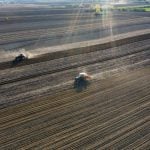Many farmers struggled to get a crop in this spring, and still others were happy to have had winter cereals in rotation to take some of the squeeze off a short seeding season. With wet weather persisting in some areas, the prospect of seeding a wider range of “winter” crops in late summer may have greater appeal and a good fit in some regions.
During an afternoon Crop Walk at Lethbridge in early June, about a dozen southern Alberta farmers had a look at field trials with winter crops being conducted by Farming Smarter (the new name for the Southern Applied Research Association) and Alberta Agriculture.
Both organizations have been looking at the potential of winter pulse crops for the past few years. Spokesmen for both organizations say they have been impressed with performance of both winter pea and lentil varieties.
Read Also

India slaps 30 per cent import duty on yellow peas
India has imposed a 30 per cent duty on yellow pea imports with a bill of lading date on or after Nov. 1, 2025.
Ken Coles, research manager for Farming Smarter, says they’ve only had about three years of field trials, but winter lentils, seeded around September 15, have shown excellent winter survival in southern Alberta and have out-yielded plots of spring-seeded varieties.
Similarly, winter peas, seeded in September have performed well with yields 50 per cent higher than spring-seeded varieties.
Alberta Agriculture research scientist Ross McKenzie says they have seen reasonably good success with both winter peas and lentils at research trials at Bow Island, Brooks, Lethbridge and Lacombe. But it appears soil temperatures are just too cold at Edmonton to make current varieties viable in that area.
Last year, for example, winter peas at Brooks yielded about 80 bushels per acre, which was considerably higher than spring-seeded varieties.
The key to the success of winter pulse crops obviously hinges on winter survival. Both peas and lentils can handle winter soil temperatures as low as minus five degrees Celsius, but survival is limited or doubtful if temperatures reach minus eight to minus 10 C. McKenzie says even though the 2010/2011 winter seemed long and cold, the average winter soil temperature monitored at Lethbridge was in the minus 4 to 5 C range.
McKenzie says he is encouraged with the potential of the two winter pulse crops. He isn’t recommending farmers seed half their farms to the crops, but he did suggest farmers may want to try 20 or 40 acres of the crops to see how they perform. Seed for both winter pea and lentil varieties are available in the U.S. Field trials in Alberta are ongoing to fine-tune seeding dates and seeding rates.
On the other hand, McKenzie says anyone holding out hope of producing winter faba beans needs to move on. Research trials with the crop show current varieties just don’t have the hardiness to survive southern Alberta winters.
For more information on the winter pulse trials contact Ken Coles by email at [email protected] or phone 403-317-0757.











